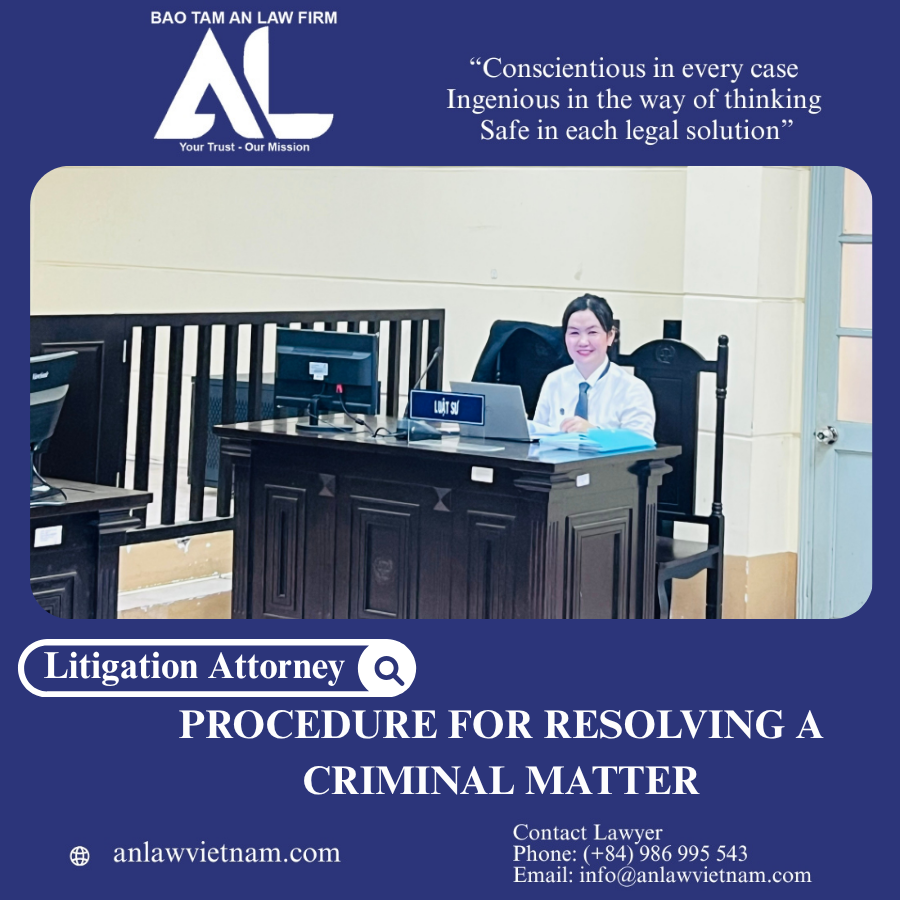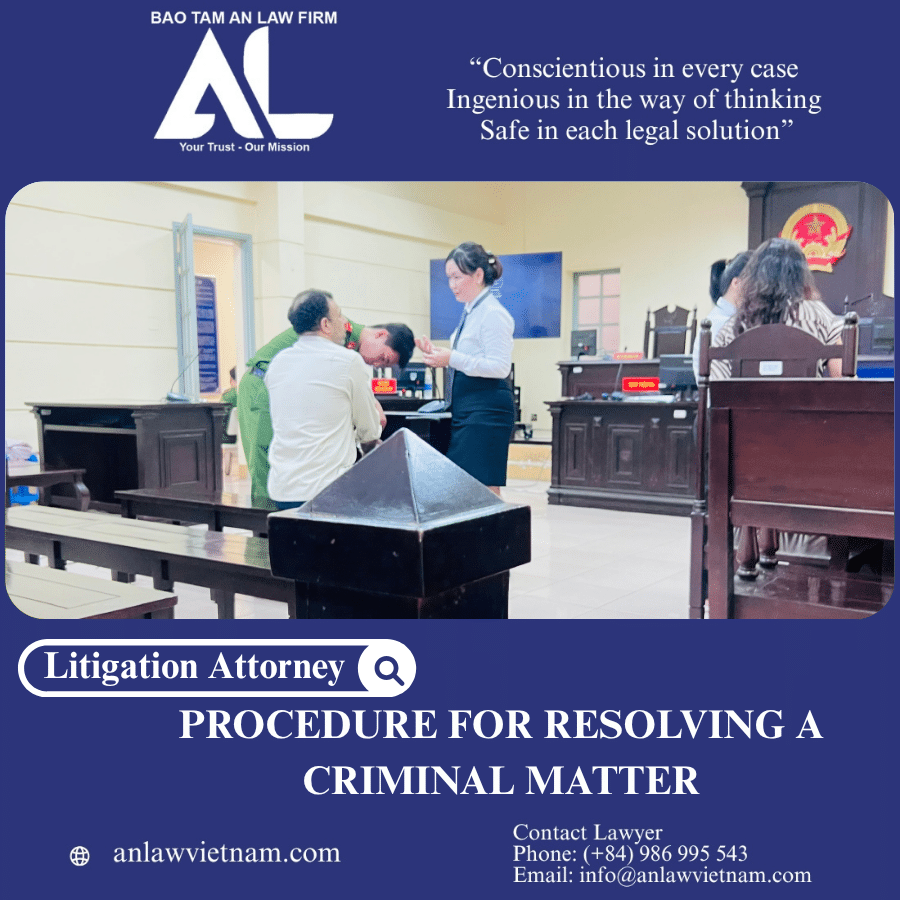Procedures For Resolving Criminal Cases In Vietnam
Lawfirm in Vietnam – Criminal Case Proceedings in Vietnam
Learn about the criminal procedure in Vietnam, from investigation to trial and enforcement. An Law Vietnam’s experienced criminal defense lawyers provide expert legal advice and representation for international clients facing criminal charges in Vietnam.
The process of resolving a criminal case in Vietnam is relatively complex and is specifically regulated under the 2015 Criminal Procedure Code. In general, the proceedings go through the following main stages:
Stage 1: Initiation of Criminal Proceedings (Commencement of Prosecution)
This is the initial stage of a criminal case, governed by Chapter IX of the 2015 Criminal Procedure Code. At this stage, competent authorities determine whether there are sufficient grounds to initiate a criminal case.
The process begins when competent authorities receive reports, denunciations, or information about an alleged crime and ends when a decision to initiate criminal proceedings is issued.
Upon receiving such information, the investigating authority conducts verification and preliminary investigation. Two scenarios may occur:
- Case 1: If it is determined that no criminal act has occurred, the investigating authority shall issue a decision not to initiate criminal proceedings, and the case will be closed.
- Case 2: If evidence indicates that a criminal act has occurred, the investigating authority shall issue a decision to initiate criminal proceedings and move to the investigation stage.
Pursuant to Article 143 of the 2015 Criminal Procedure Code, the following bodies have the authority to initiate criminal proceedings:
- Investigating agencies;
- Agencies assigned to conduct certain investigative activities;
- The People’s Procuracy (Prosecutor’s Office);
- The Trial Panel (Court).

Stage 2: Investigation of the Criminal Case
At this stage, the investigating agency applies all measures prescribed by the Criminal Procedure Code to establish the facts of the crime and identify the offender, forming the basis for the trial by the Court. This stage is regulated from Chapters X to XVII of the Code.
The objectives of the investigation include:
- Identifying the criminal act and the offender;
- Determining damages caused by the crime;
- Establishing causes and conditions leading to the crime and recommending preventive or corrective measures.
Investigation activities may include:
- Initiating charges and interrogating suspects;
- Taking statements from witnesses, victims, civil plaintiffs, civil defendants, and other related parties;
- Conducting confrontations and identification procedures;
- Searching and seizing documents or evidence;
- Examining crime scenes and corpses, conducting forensic examinations, or reconstruction of events;
- Appraising and valuing property.
Depending on the nature of each case, the investigating body may conduct preliminary investigation before or after initiation of proceedings. Information about the case may or may not be disclosed publicly.
Upon completion, the investigating authority issues an investigation conclusion report and recommends prosecution if sufficient evidence exists. Otherwise, it may suspend the investigation in accordance with the Code.
Stage 3: Prosecution of the Criminal Case
Once the investigation is completed, the competent authority forwards the case file and recommendation to the People’s Procuracy for prosecution. Upon receipt, the Procuracy shall review the file within the statutory time limit and decide to:
- Prosecute the accused before the Court by means of an indictment;
- Return the file for additional investigation; or
- Suspend or temporarily suspend the case or the proceedings against the accused.
Within 03 days (or 10 days for complex cases), the Procuracy must transfer the indictment and case file to the Court.

Stage 4: Trial of the Criminal Case
This stage is governed by Part IV of the 2015 Criminal Procedure Code and begins when the Court receives the case file from the Procuracy.
The trial must be conducted orally, directly, and continuously. The Court may only adjudicate the accused and charges as stated in the indictment and the decision to bring the case to trial. Upon conclusion, the Trial Panel shall issue a judgment or decision.
If the first-instance judgment is not appealed or protested, it becomes legally effective and is executed accordingly. Otherwise, further proceedings may occur, including:
- Appellate trial (if the first-instance judgment or decision has been appealed or protested);
- Cassation review (if a legally effective judgment or decision shows signs of legal violation);
- Reopening procedure (if new evidence emerges that could fundamentally change the case outcome).
Stage 5: Enforcement of Judgments and Court Decisions
This final stage is implemented after the Court’s judgment has become legally effective, regulated under Part V of the Code.
Once effective, the Chief Judge of the first-instance Court shall issue or delegate the issuance of an enforcement decision, which will be carried out by the Criminal Judgment Enforcement Agency.
The enforcement decision must be issued within 07 days from the date the judgment or decision becomes effective (either from the first-instance, appellate, cassation, or reopening procedure).
In summary, a criminal case typically goes through five procedural stages: initiation, investigation, prosecution, trial, and enforcement. However, in certain cases, additional stages such as appeal, cassation, or reopening may occur.
According to Article 55 of the 2015 Criminal Procedure Code, participants in criminal proceedings include:
- Persons denouncing or reporting crimes;
- Persons being denounced or subject to criminal recommendation;
- Persons detained in urgent cases;
- Persons arrested or temporarily detained;
- Defendants (accused persons);
- Victims;
- Civil plaintiffs and defendants;
- Persons with related rights and obligations;
- Witnesses and observers;
- Expert witnesses and property appraisers;
- Interpreters and translators;
- Defense counsels;
- Representatives protecting the lawful rights and interests of victims, litigants, or persons subject to denunciation;
- Legal representatives of criminally charged legal entities and other representatives as prescribed by law.
A criminal case involves not only the procedural authorities (Police, Procuracy, and Court) but also the participation of various parties to ensure objectivity, fairness, and compliance with the law.
With in-depth legal expertise, international experience, and local insight, An Law Vietnam has successfully represented and defended the rights of hundreds of international clients involved in criminal proceedings in Vietnam.
Our team of lawyers — many of whom have years of experience working for multinational corporations in Vietnam — will accompany, advise, and represent you in handling all legal matters within Vietnam’s jurisdiction.
To protect your rights in case of any accusation, investigation, or summons by competent authorities in Vietnam, please contact An Law Vietnam immediately for prompt legal advice and representation.
Contact
📞 Phone: (+84) 986 995 543
📧 Email: info@anlawvietnam.com
📍 Head Office: Diamond Plaza, 34 Le Duan Street, Saigon Ward, Ho Chi Minh City, Vietnam
🏢 Vung Tau Branch: Vo Thi Sau Street, Vung Tau City, Ho Chi Minh City
